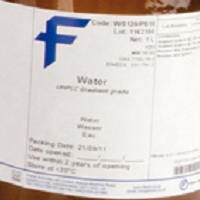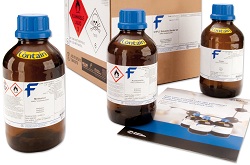ULTRA High Pressure Liquid Chromatography (UHPLC) is a powerful separation technique involving high pressure (around 350bar, 5000psi or more) and small stationary phase particles of typically 2um or smaller.
It also requires a solvent, of course. Thermo Fisher has introduced a new range of UHPLC solvents that it says minimise baseline noise and reduce pump blockages. That may be true, but we’re struggling with the company’s claim that this is a “unique range” of solvents.
The three fluids are in fact fairly well known: acetonitrile, methanol, and water. Thermo says these “have been designed for use with the UHPLC pump to ensure maximum sensitivity and resolution”.
The bottled products are filtered to remove particles down to 0.1um, which the company says eliminates even the finest particles that could block the pump or valve under pressure. This also ensures an interference-free, low baseline noise at 210 and 254nm, apparently.

Bottled water was never so pure
Besides this, the solvents promise a high UV transmission rate, making them suitable when using UV detection, and low acidity and alkalinity levels.
We’re sure, here at the LabHomepage, that this is all good. But we’re slightly unnerved to see Thermo apparently claiming to have designed water (or acetonitrile or methanol, for that matter).

